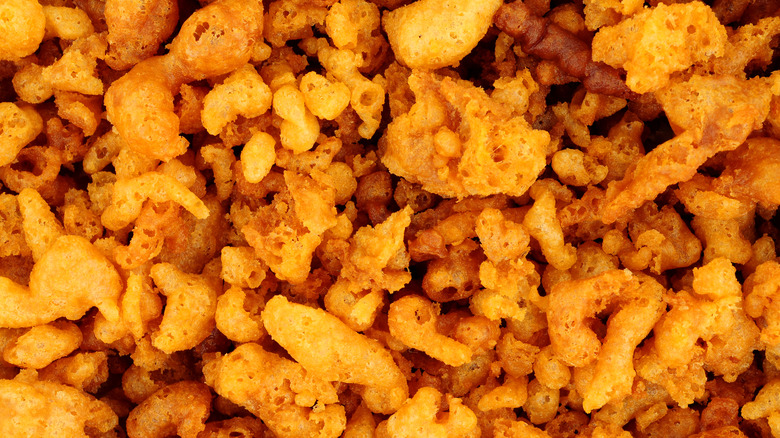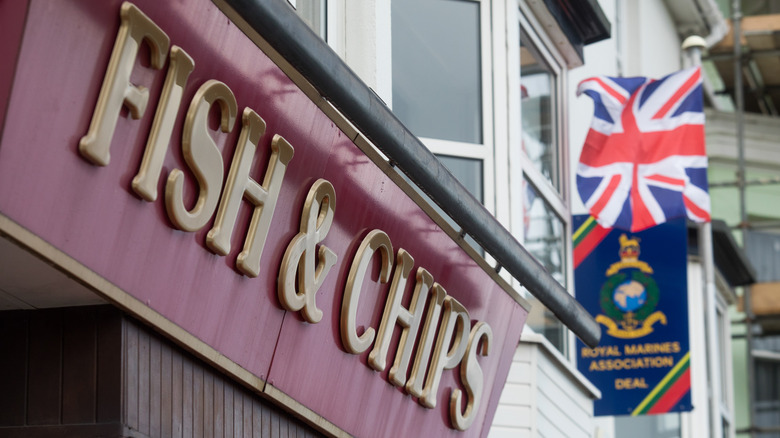Fried Batter Scraps Are A Key Part Of The UK Fish And Chips Experience
Fish and chips are so essential to the U.K.'s food scene that British foodies have colloquial names for the pieces of leftover fish batter. Whether you call them "scraps," "scrumps," or "bits," chances are pretty good that you'll be jazzed to find 'em in the bottom of your basket. Some fish and chip shops even offer baskets of these scraps for free.
A classic British fish and chips uses a simple batter of flour, salt, and beer, but its simplicity hasn't stopped foodies nationwide from craving it. According to The National Federation of Fish Friers (NFFF) via The Yorkshire Post, folks in Yorkshire eat the most batter scraps of any demographic in the United Kingdom. Due to their enduring popularity, some "chippies" (the British name for these establishments) have been starting to put a price on the sought-after morsels, and to-charge or not-to-charge has quickly emerged as the center of heated debate. As Yorkshire foodie Pete Hirst told the Post last year, "[Scraps] are a human being's birthright — it's like paying for salt and vinegar — absolute madness." Still, NFFF President Andrew Crook told the outlet that fans shouldn't worry too much: "Some charge a nominal fee, but it's never going to be a big money spinner."
Fish fry fans run deep
Foodies may have some cause to be concerned about the sanctity of their scraps. In May 2022, the Russia-Ukraine crisis drove the price of cooking oil and seafood exports sky-high, which directly impacted U.K. fish-and-chip shops' supplies of sunflower oil, cod, and haddock. Then again, in February 2023, the overseas crisis continued to impact the global seafood industry when the U.S. sanctioned Russian seafood exports, driving prices even higher for American "chippy" fans. Charging for scraps could be a way to offset higher operation and product costs — but it's highly doubtful that fish and chips are going anywhere.
Originally, the dish was birthed as a cultural culinary fusion, as East End Jews brought the fried fish and Lancashire and Yorkshire brought the chips. Per the lore, folks in the U.K. have been enjoying the dish since the early 1800s. A "fried fish warehouse" is even mentioned in Charles Dickens' 1839 classic "Oliver Twist." Fish and chips swiftly became so popular and inextricably interwoven into Great Britain's zeitgeist that it wasn't rationed during either of the World Wars to boost morale. Then-Prime Minister Winston Churchill called fish and chips "the good companions." High-profile fans range from The Beatles to Alfred Hitchcock and George Orwell. (John Lennon ate his with ketchup.) But, the dish isn't just beloved by native Englishmen. If anything, it seems that despite the external forces threatening the beloved dish, contemporary fans have only strengthened their resolve over time.
Modern love
Today, the roughly 94,000 square-mile country is home to over 10,000 fish and chip shops. Roughly 382 million baskets are sold in the U.K. every single year — and that's only counting sales from designated fish and chips shops. The already-high figure becomes even more impressive considering the U.K.'s total population in 2023 is just under 68 million. (That comes out to roughly 5½ baskets per every person in the county.) U.K. native Chef Gordon Ramsay names fish and chips his all-time favorite go-to comfort food. The country even hosts the highly prestigious annual National Fish and Chip Awards with strict judging rules, illustrating the dish's position as both accessible pub fare and cuisine to be taken seriously, down to the leftover scrumps.
A slew of regional differences has cropped up, as well: Aberdeen eats the most haddock, Glasgow likes theirs with pickled onions, and Manchester prefers gravy and mushy peas. The zeal has stretched across an ocean as global foodies flock to fish and chips restaurants in the U.S., too. Just pop into the cleverly named A Salt and Battery in Manhattan's Greenwich Village on a Saturday at lunchtime and see what we mean. (Whether or not your favorite local chippy will charge you for scraps remains to be seen.)


